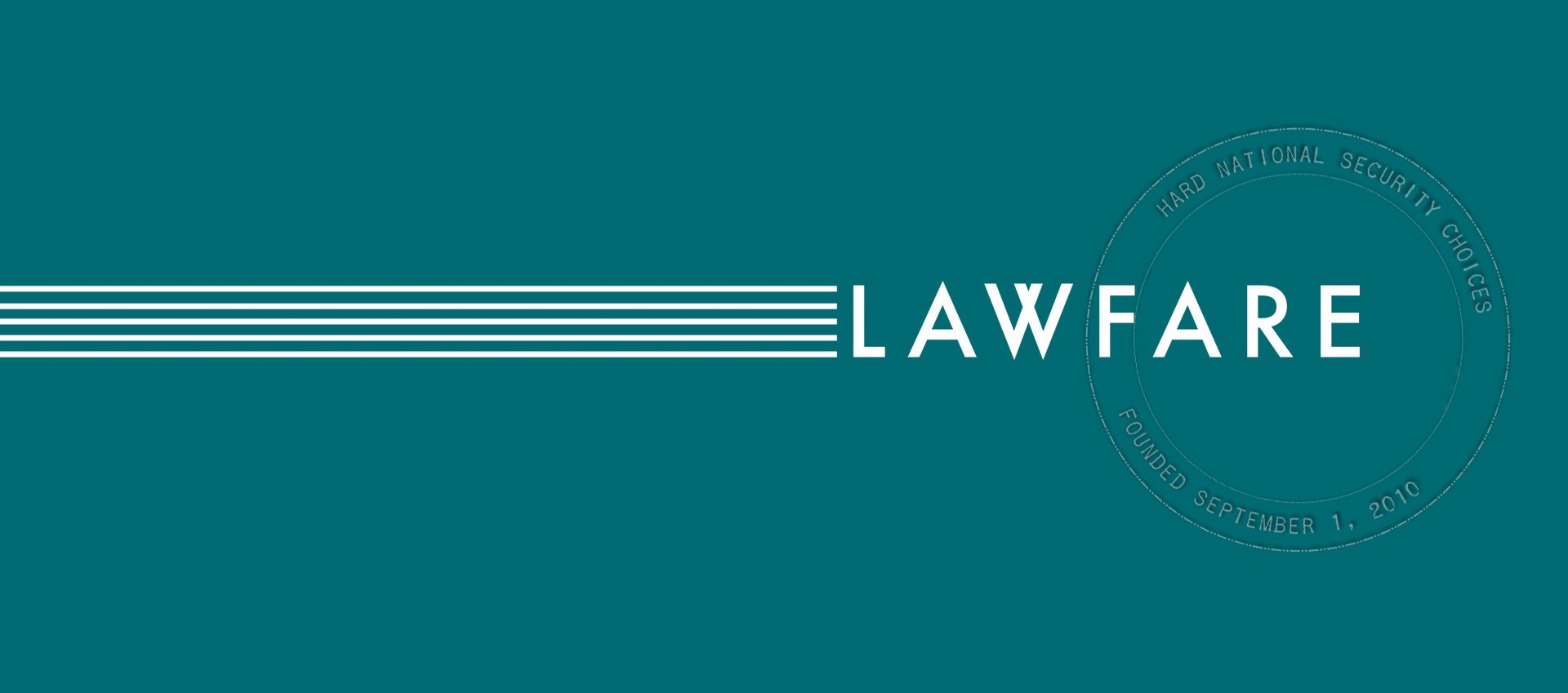The Week That Was: All of Lawfare in One Post

Published by The Lawfare Institute
in Cooperation With

Eugenia Lostri, Alan Z. Rozenshtein, and Chinmayi Sharma discussed the firing and subsequent rehiring of OpenAI’s CEO Sam Altman. They explained why the technology industry cannot be trusted to self-regulate and that efforts to slow down the development of artificial intelligence will have to come from top-down government regulation.
Quinta Jurecic and Katherine Pompilio discussed the shutdown of Omegle and the implications of using the Allow States and Victims to Fight Online Sex Trafficking Act to circumvent the immunity given to platforms under Section 230 of the Communications Decency Act.
Caleb Benjamin shared a U.S. District Court for the District of Montana judge’s preliminary injunction blocking Montana’s TikTok ban.
Preston Marquis and Benjamin Wittes discussed the different legislative camps and issues pushing FISA Section 702 reauthorization to the wire and evaluated the two proposed reauthorization bills.
Kenneth Propp discussed negotiations toward an EU-U.S. agreement on electronic evidence and the three issues central to the talks: competing views on the form of an agreement, its utility in addressing conflicts between U.S. and European law, and the handling of individual rights.
On the Lawfare Podcast, in an edition of Arbiters of Truth, Lawfare’s series on the information ecosystem, Jurecic and Lostri sat down with Matt Perault and Scott Babwah Brennen to discuss the potential risks and benefits of generative AI when it comes to political advertising, which concerns are overstated and which are worth closer attention as 2024 approaches, and more:
Anna Bower unpacked the Georgia Bureau of Investigation (GBI) report on unauthorized access to voting equipment in Coffee County and discussed the numerous ways in which it falls short, including the omission of several publicly available key facts.
On the Lawfare Podcast, Wittes sat down with Bower to discuss the GBI report and her article:
On this week’s episode of “Lawfare Live: Trump’s Trials and Tribulations,” Wittes sat down with Bower, Kyle Cheney, and Roger Parloff to discuss a New York appellate court’s ruling reinstating the gag order on former President Donald Trump in the New York civil case, developments in Colorado Section 3 litigation, Harrison Floyd’s bond revocation hearing, and more:
On the Lawfare Podcast, Rozenshtein shared audio from a panel at the University of Minnesota Law School’s conference on Section 3 of the 14th Amendment and the 2024 election. In the episode, Nick Bednar sat down with Ned Foley, Derek Muller, and Andrea Katz to discuss the interplay between the Section 3 challenges and election law:
On Lawfare No Bull, Benjamin shared edited audio of a Nov. 21 hearing in Fulton County, Georgia in which Judge Scott McAfee heard arguments on whether Harrison Floyd, the former leader of Black Voices for Trump, should have his bail revoked for using X to indirectly communicate with witnesses:
On the Lawfare Podcast, Wittes and Jurecic sat down with Tiana Epps-Johnson to discuss the Center for Tech and Civic Life’s work providing technical and financial assistance to election workers; the lawsuits, investigations by state attorneys general, and other forms of harassment she has faced as a result of the work; and more:
Pompilio shared a D.C. Circuit court ruling in Blassingame v. Trump that Trump can be sued for civil damages for inciting the Jan. 6 attack.
Chibli Mallat proposed reframing the struggle between Israelis and Palestinians as a civil war, and understanding the current Israel-Hamas conflict as a battle within it. He argued both sides should agree to a cease-fire and commit to nonviolence, which would help facilitate an enduring solution to governance in Israel-Palestine.
On the Lawfare Podcast, Hyemin Han sat down with Mark Lattimer to discuss his recent piece in Lawfare arguing that Israel’s tolerance for civilian deaths surpasses that of the United States and United Kingdom’s in their war against ISIS:
On the Lawfare Podcast, Tyler McBrien sat down with Brian Finucane and Josh Paul to discuss the scale and process of U.S. weapons transfers, the domestic and international law that govern these transfers, and whether the U.S. is complicit and liable for war crimes committed with its weaponry:
Saeed Bagheri discussed the legality of the Israeli Defense Forces’ actions in Gaza with respect to their potential environmental impacts.
On Rational Security, Scott R. Anderson and Jurecic sat down with Lostri and Molly Reynolds to discuss the looming House and Senate showdown over national security priorities, the ousting and subsequent rehiring of Sam Altman as CEO of OpenAI, the fragile pause in hostilities that has emerged in the Israel-Hamas war, and more:
Matei Alexianu and Ali Hakim discussed a Southern District of New York judge’s ruling in Petersen v. Argentina ordering Argentina to pay $16 billion in damages to two minority shareholders of a state-controlled Argentinian oil company.
McBrien discussed New York City Mayor Eric Adams’s ties to Turkey and the benefits and risks of subnational diplomacy.
Matt Gluck shared a Justice Department indictment of an Indian national for his alleged participation in a plot to assassinate a Sikh activist in New York City.
On Chatter, Wittes sat down with Peter Strzok to discuss his career in counterintelligence, how he ended up in the line of work, and the numerous places he has called home:
Amanda L. Tyler argued that founding-era laws disarming “loyalists” support upholding the law—federal legislation criminalizing possession of firearms by persons subject to domestic violence protective orders—at issue in United States v. Rahimi.
In an installment of the Seriously Risky Business cybersecurity newsletter, Tom Uren discussed hostile actors’ use of living off the land techniques to target small and medium-sized businesses, how breaches at Fidelity National Financial and at CTS disrupted housing markets, and more.
In another installment of Seriously Risky Business, Uren discussed Indian firm Appin’s role in birthing India’s hack-for-hire industry, the evolving tactics of Russian cyber operations and Russia’s flailing attempts to recruit and develop cyber talent, and more.
And Scott Shapiro, Sean O’Brien, and Wittes shared the 10th class in Lawfare’s Hacking and Cybersecurity course, entitled, “Anonymity & The Dark Web.” They covered web exploitation, Metasploit, and more.
And that was the week that was.

